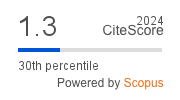Diagnosis and management of Crohn's disease in retarded child
Vol. 42 No. 2 (2009): June 2009
Articles
June 1, 2009
Downloads
Amtha, R. (2009). Diagnosis and management of Crohn’s disease in retarded child. Dental Journal (Majalah Kedokteran Gigi), 42(2), 55–59. https://doi.org/10.20473/j.djmkg.v42.i2.p55-59
Downloads
Download data is not yet available.
- Every manuscript submitted to must observe the policy and terms set by the Dental Journal (Majalah Kedokteran Gigi).
- Publication rights to manuscript content published by the Dental Journal (Majalah Kedokteran Gigi) is owned by the journal with the consent and approval of the author(s) concerned.
- Full texts of electronically published manuscripts can be accessed free of charge and used according to the license shown below.
- The Dental Journal (Majalah Kedokteran Gigi) is licensed under a Creative Commons Attribution-ShareAlike 4.0 International License

















